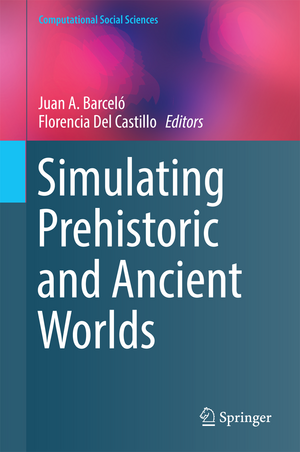Simulating Prehistoric and Ancient Worlds: Computational Social Sciences
Editat de Juan A. Barceló, Florencia Del Castilloen Limba Engleză Hardback – noi 2016
| Toate formatele și edițiile | Preț | Express |
|---|---|---|
| Paperback (1) | 605.41 lei 38-44 zile | |
| Springer International Publishing – 23 iun 2018 | 605.41 lei 38-44 zile | |
| Hardback (1) | 628.80 lei 38-44 zile | |
| Springer International Publishing – noi 2016 | 628.80 lei 38-44 zile |
Din seria Computational Social Sciences
- 15%
 Preț: 649.39 lei
Preț: 649.39 lei - 18%
 Preț: 964.54 lei
Preț: 964.54 lei - 15%
 Preț: 643.34 lei
Preț: 643.34 lei - 15%
 Preț: 640.88 lei
Preț: 640.88 lei - 20%
 Preț: 338.16 lei
Preț: 338.16 lei -
 Preț: 390.63 lei
Preț: 390.63 lei -
 Preț: 395.47 lei
Preț: 395.47 lei - 20%
 Preț: 662.11 lei
Preț: 662.11 lei - 20%
 Preț: 618.06 lei
Preț: 618.06 lei - 20%
 Preț: 760.97 lei
Preț: 760.97 lei - 20%
 Preț: 649.93 lei
Preț: 649.93 lei - 20%
 Preț: 761.44 lei
Preț: 761.44 lei - 15%
 Preț: 643.48 lei
Preț: 643.48 lei - 18%
 Preț: 1117.34 lei
Preț: 1117.34 lei - 20%
 Preț: 1169.47 lei
Preț: 1169.47 lei -
 Preț: 432.12 lei
Preț: 432.12 lei -
 Preț: 393.13 lei
Preț: 393.13 lei - 18%
 Preț: 887.38 lei
Preț: 887.38 lei -
 Preț: 383.93 lei
Preț: 383.93 lei - 20%
 Preț: 241.67 lei
Preț: 241.67 lei - 15%
 Preț: 523.07 lei
Preț: 523.07 lei -
 Preț: 428.07 lei
Preț: 428.07 lei - 15%
 Preț: 693.06 lei
Preț: 693.06 lei -
 Preț: 487.75 lei
Preț: 487.75 lei - 20%
 Preț: 1166.19 lei
Preț: 1166.19 lei - 15%
 Preț: 696.02 lei
Preț: 696.02 lei - 20%
 Preț: 1156.62 lei
Preț: 1156.62 lei - 25%
 Preț: 470.32 lei
Preț: 470.32 lei
Preț: 628.80 lei
Preț vechi: 786.01 lei
-20% Nou
Puncte Express: 943
Preț estimativ în valută:
120.32€ • 125.63$ • 99.36£
120.32€ • 125.63$ • 99.36£
Carte tipărită la comandă
Livrare economică 11-17 aprilie
Preluare comenzi: 021 569.72.76
Specificații
ISBN-13: 9783319314792
ISBN-10: 3319314793
Pagini: 388
Ilustrații: VI, 404 p. 112 illus., 62 illus. in color.
Dimensiuni: 155 x 235 x 27 mm
Greutate: 0.93 kg
Ediția:1st ed. 2016
Editura: Springer International Publishing
Colecția Springer
Seria Computational Social Sciences
Locul publicării:Cham, Switzerland
ISBN-10: 3319314793
Pagini: 388
Ilustrații: VI, 404 p. 112 illus., 62 illus. in color.
Dimensiuni: 155 x 235 x 27 mm
Greutate: 0.93 kg
Ediția:1st ed. 2016
Editura: Springer International Publishing
Colecția Springer
Seria Computational Social Sciences
Locul publicării:Cham, Switzerland
Cuprins
Simulating the Human Past for Understanding the Present. A critical review.- Multi-Scale Agent-Based Simulation of Long-Term Dispersal Processes: Towards a Sophisticated Simulation Model of Hominin Dispersal.- An Agent-Based Model of Resource Distribution on Hunter-Gatherer Foraging Strategies: Clumped Habitats Favor Lower Mobility, but Result in Higher Foraging Returns.- Testing Brantingham’s Neutral Model: The Effect of Spatial Clustering on Stone Raw Material Procurement.- Population Spread and Cultural Transmission in Neolithic Transitions.- Modelling Routeways in a Landscape of Esker and Bog.- Modelling Cultural Shift: Application to Processes of Language Displacement.- Pathways for Scale and Discipline Reconciliation: Current Sociological Modelling Methodologies to Explore and Reconstitute Human Prehistoric Dynamics.- Simulating Land Use of Prehistoric Wetland Settlements: Did Excessive Resource Use Necessitate a Highly Dynamic Settlement System?.- Revisiting the DynamicsBetween two Ancient Japanese Descent Groups: What happened from the Jomon to the Yayoi Periods in Japan.- Cultural and Genetic Transmission in the Jomon-Yayoi Transition Examined in Agent-Based Demographic Simulation.- Economic Sustainability in Relation to Demographic Decline of Celtic Agglomerations in Central Europe – Multiple-Scenario Approach.- Zambeziland: A Canonical Theory and Agent-Based Model of Polity Cycling in the Zambezi Plateau, Southern Africa.- Personalities, Physiology, Institutions and Genetics: Simulating Ancient Societies with Intelligent Virtual Agents.
Recenzii
“It offers a synthesis of agent-based modeling to date, provides multiple well-developed case studies, and contributes to the literature on formal models in archaeology by demonstrating the utility of simulation. … From Barceló and del Castillo’s encyclopedic introduction, to each of the well-developed case studies, this volume adds to a growing field and will be useful for archaeologists and computer scientists interested in prehistory.” (Stefani Crabtree, JASSS The Journal of Artificial Societies and Social Simulation, Vol. 20 (2), March, 2017)
Textul de pe ultima copertă
This book presents a unique selection of fully reviewed, extended papers originally presented at the Social Simulation Simulation Conference 2014 in Barcelona, Spain. Only papers on the simulation of historical processes have been selected, the aim being to present theories and methods of computer simulation that can be relevant to understanding the past. Applications range from the Paleolithic and the origins of social life up to the Roman Empire and Early Modern societies. Case studies from Europe, America, Africa and Asia have been selected for publication. The extensive introduction offers a thorough review of the computer simulation of social dynamics in past societies as a means of understanding human history. This book will be of great interest to researchers in the social sciences, archaeology, evolutionary anthropology, and social history.
Caracteristici
Includes an introductory chapter covering the complete field of computer simulations of past societies, with an exhaustive, commented list of applications, chronologically arranged from the Paleolithic until Modern societies Numerous case studies that help the reader to understand this approach in a new and radical new way Detailed presentations of computer models that help the reader to apply computer methods of social simulation to ongoing research projects in history, archaeology and anthropology Includes supplementary material: sn.pub/extras














